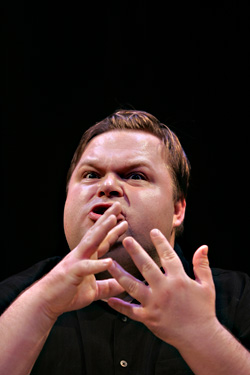Writer and performer Mike Daisey’s new one-man show, Great Men of Genius, premiering this weekend at CHAC, is an exercise in biographical deconstruction, emphasizing the complicated, socially contrived, and generally ill-defined notion of genius. What, Daisey asks, constitutes genius—more precisely, what exactly do we mean when we agree, as a culture, to lavish a historical figure with such singular praise? Daisey’s method will be inductive, and his list of “great men” is as typically idiosyncratic as it is weirdly compelling: Bertolt Brecht, P.T. Barnum, Nikola Tesla, and L. Ron Hubbard.
These four men are united by his obsession, Daisey says. “I’m obsessed with their genius and I’m obsessed with their flaws.” Though his interest stretches back many years, it was only in the last six months or so that Daisey thought of drawing together their biographies under one title. For him, the most compelling thing about these men is their tragic aspect. “All four of them, to different degrees, come to a bad end,” he says, pointing out that they also all suffered tortured relationships with women. As a wry nod to these observations, Daisey has ordered the linked monologues accordingly: “The four are lined up in order of increasing insanity,” he laughs, noting that the founder of Scientology was easily the buggiest of them: “It’s entirely possible that he mixed his own Kool-Aid and then drank it.”
For Daisey, whose past monologues—including The Ugly American and the off-Broadway hit 21 Dog Years, about his tenure at Amazon.com—largely have mined the intimate stuff of his own life, bringing other people’s stories to the stage has required a “profoundly different” approach to theater. “It’s not a great forum for the factual transmission of data,” Daisey says. “You don’t have room for anything. You don’t have time. What’s much more interesting is the human drive, patterns of behavior. [Theater] communicates momentum and drive and intense energy.”
Daisey compares his dramatic technique, developed with longtime collaborator and director Jean-Michele Gregory, to British stand-up comedy, with its strong roots in storytelling and narrative arc. The trick, Daisey says, will be to create the immediacy of autobiography, a feat he hopes to accomplish by eking out the dynamic of genius itself—by unpacking social (and mostly tacit) definitions of “genius” while investigating the “great men”‘s connection to, and influence on, society at large.
Gregory, who compares directing to editing a manuscript, says she and Daisey had to use “different tools” to shape this new work for the stage. “The challenge is finding a way to get the audience to connect to it,” she says. “The first [of Daisey’s] shows were all autobiographical. This is very different. It just opens up the pool of information so much that it can be overwhelming . . . [but] Mike is really, really good at distilling the heart of a story. It’s like having a whole other canvas to work with.”
To some extent, the heart of these stories will reveal itself during the process of inquisition. Daisey, working sans script, is excited to see what happens when he finally hits the stage. The lives he’s chosen to explore are for him still very much an enigma, as is the label that unites them. “This is really going to be interesting,” he says. “I’ll be giving birth to each of the monologues on successive nights. I think it’s interesting to wrestle with the idea of genius. Is it actually something that exists, or is it just a useful term for when the meters that we have in our heads peg out at 100 percent?”
Obviously, Daisey cautions, there are no clear answers, and that ambiguity, rather than creating obstacles, should invigorate the project. “When you look closely at the thing itself,” he says, “instead of simplifying, it grows—it has that richness.”








